|
|
|
Quotes, Letter & Diaries
In Their Own Words...
Quotes
"Richmond
and Corinth are now the great strategical points of the war, and our
success at these points should be insured at all hazards." Federal
General Henry W. Halleck, May 25, 1862
"...hundreds
of wounded soldiers who fill almost every house - public and private
- in Corinth. Truly is a noble deed & most worthy of imitation.
We
have but few of the citizens of Corinth - two ladies - who have acted
thus nobly, tho many have given up their houses, while other have been
taken possession of by orders of the Generals'." Horatio Letters
to Josie, April 12, 1862
"The battle
was continued. Early in the morning the enemy threw shells and cannon
balls in the town of Corinth, and it looked as if they would ruin
and take the town, but our heavy guns soon silenced theirs. Afterward
the enemy tired strong bayonet and musketry attacks on our forces, but
each
time they were repulsed with heavy losses, and finally, on October 4,
at about 11:30, they retreated and were put to flight, with our troops
following.
Our regiment pursued them only as far as the hospital of the secessionists,
where we captured the wounded and enlisted ones and held them under
guard, until they were brought to Corinth. But, Oh, how many gave up
the ghost and were sunk in the ground, wrapped in a blanket, before
they were mustered. It is terrible to be compelled to stand by and see,
how much the poor mutilated fellows have to suffer!" Stephen Werly
Diary,
October 4, 1862
"...his
storming of the redoubt was the most desperate and murderous charge
that has been made during the war, this is shown by the rebel
graves that cover the space before the fort. Gen. Rogers is buried within
10 steps of the ditch, and his men lie in long trenches close by."
Thomas
Carlisle Letter, October 18, 1862
Diaries and Reports
Accounts of Skirmish at Farmington and Union Army Moving into Corinth, May 1862
Barnes, J.W. - Order

Execution of Alex Johnson, 1st Alabama Cavalry, U. S. Greenville Dodge
Collection - Iowa State Historical Library.
Morrow, Maud - Diary in Corinth
Nelson, Joseph Kibler - Winter 1863-1864 Recollections
Nelson, Joseph Kibler - Recruiting Colored Infantry
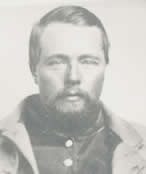
Garrett Schreurs, Schreurs Family Material, Iowa State Historical Library.
Opposing Forces of the Battle of Corinth
Strickling, Joseph Mitchell - Diary
Strickling, Joseph Mitchell - Diary 2
--------------------------------------------------------------------------------
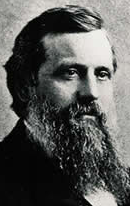
John Eaton, Superintendent of Contrabands for the Mississippi Valley,
form Eaton, John, Grant Lincoln and the Freedmen: Reminiscences
of the Civil War with Special Refrences to the Work for the Contrabands
and Freedmen of the Mississippi Valley.
(Longmans, Green & Co., New York, 1907).
Letters
Bowen, W.A. - Camp Near Holly Springs
Bowen, W.A. - Transcription of Letter
Browne, I.M.
Culbertson, Washington Lafayette
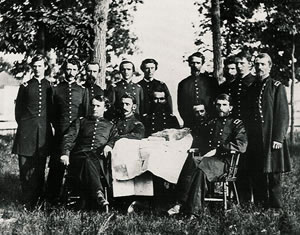
Dodge and his officers. Greenville Dodge Collection - Iowa State
Historical Library. Photo made in Corinth. Seated L-R, Capt. George
E. Spencer,
Surgeon W. R. Marsh, Lt. Col. R. S. Barnhill, Major General Greenville
Dodge. Standing L-R, Capt. J. W. Barnes, A. D. C., Lt. O.H. Dodds,
Chief Quartermaster, Capt. C. C. Carpenter, Com. Of Subsistence, Lt.
J. K. Wing, Ass't Q.M., Lt. J. H. Hogan, Ass't Ordinance Officer,
Major Howard, Judge Advocate, Capt. Henry Horn, Ass't Provost Marshall,
Capt. B. P. Chenowith, Inspector General, Lt. L. M. Bailey, A. D. C.
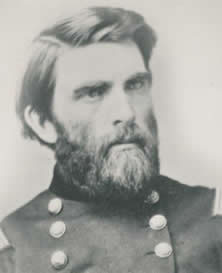
Major General Greenville Dodge, Greenville Dodge Collection - Iowa
State Historical Library.
Dodge, G.M. - Special Orders, Grenville Dodge, 1863-1864
Kennett, N.J.
Kennett, N.J.
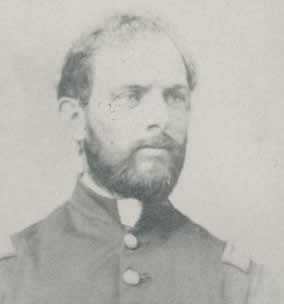
2nd Lieutenant Jay Ward Redfield, Company I, 39th Iowa Infantry, from
Jay Ward Redfield Papers, Iowa State Historical Library.
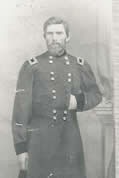
Major General Greenville Dodge, Greenville Dodge Collection - Iowa
State Historical Library.
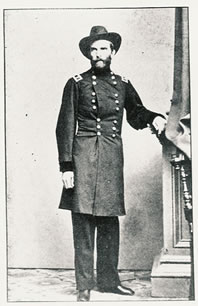
Major General Greenville Dodge, 1864, from Smith, Charles H., The History
of Fuller's Ohio Brigade, 1861-1865, It's Great March,
with Portraits, Battle Maps and Biographies. (A. J. Watt, Cleveland,
Ohio, 1909) p. 130.
Civil War Nurses
Angles of the Battlefield
Kate Cumming, a
native of Edinburgh, Scotland, was living in Mobile, Alabama, at the
outbreak of the Civil War. Despite opposition from family
members, she became a nurse for the Confederate cause. In April 1862,
she boarded the train that carried her into action. Cumming arrived
in
Corinth just after the Battle of Shiloh and quickly assumed the duties
of a nurse. Most of these activities centered around the Tishomingo
Hotel.
In her diary, she described bathing wounds, delivering water, and a
host of other duties. The mutilation and deaths of soldiers often saddened
her,
but Kate persevered. She remained in Corinth until the threat of Federal
occupation pushed her southward. She later served the Confederacy in
Okolona, Mississippi and Chattanooga, Tennessee.
Ella King Newsome,
known as the Florence Nightingale of the South, was a native Mississippian
and is considered a pioneer in Civil War nursing.
The widow of Dr. Frank Newsome at the outbreak of the Civil War, Ella
King, living in Arkansas, resolved to devote her energy and wealth to
the
field her husband loved - medicine. To do her part in the War effort,
Ella took servants and supplies to Memphis, Tennessee, where she worked
in
the City Hospital with camp soldiers. Later, she went to Bowling Green,
Kentucky; Nashville, Tennessee; and Winchester, Tennessee. It was from
Winchester that she was summoned to Corinth. She served at the Corinth
House Hotel Hospital. Kate Cumming, in Corinth at the same time as
Ella, deeply admired her work.
Mary Ann "Mother"
Bickerdyke was born in Knox County, Ohio, in 1817. By the outbreak of
the Civil War, Mary Ann was Mrs. Bickerdyke, a
widowed mother of two young sons, living in Galesburg, Illinois. When
her church sent supplies to Cairo, Illinois, for Federal soldiers, she
went
along and was subsequently devoted to the Cause. After the Battle of
Shiloh, Bickerdyke was put in charge of the field hospital at Farmington,
Mississippi, and once the Federal Army secured Corinth, she took responsibility
over Corona College Hospital. Mother Bickerdyke quickly became
a favorite among the soldiers, for she saw that their needs were met,
whether it be a cold drink of water or clean dressings. Bickerdyke also
gained
the respect of many Northern Generals, including Grant and Sherman.
When one lower ranking officer began to complain about
"that woman Bickerdyke"to Sherman, the General heartily replied,
"Only God outranks her."
Home | Coming Events | Places to Visit | Tours | Photos & Video | History | In Their Own Words | Contact
web design byzacksteen.com

